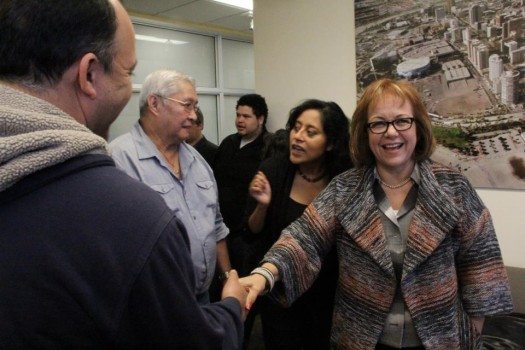

Hyatt hotels in Long Beach, UNITE HERE Local 11 and Long Beach City Councilwoman, Dr. Suja Lowenthal, announced Monday that associates at the city’s Hyatt Regency and Hyatt The Pike have elected to be represented by UNITE HERE Local 11.
All Hyatt associates who will be represented by UNITE HERE Local 11 in Long Beach were eligible to vote in the election, which was supervised by an independent election judge. The judge verified the results last week, noting that a majority of Hyatt associates who were eligible to vote chose to have UNITE HERE represent them. Hyatt associates were notified last week of the election results.
“We’ve always maintained strong relations with our associates and unions representing Hyatt associates in other locations, and we’ve always believed Hyatt associates should have the right to choose union representation in an election,” said Stephen D’Agostino, General Manager of Hyatt Regency Long Beach. “We look forward to working with UNITE HERE to reach a contract that will continue to support our associates and maintain our high workplace standards.”
In November 2012,

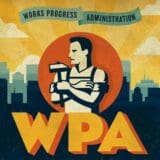
The question we must ask today, as we remember the Works Progress Administration is: Why isn’t there the political will to take dramatic steps to address today’s jobs emergency?
Let’s start with the obvious; there was a far greater share of Americans unemployed in the Great Depression. In 1934, unemployment peaked at 24.9 percent. One-out-of-four people officially out of work is much more of a crisis than one-out-of ten (9.6 percent), the peak in the current recession in 2010. The impact is even greater than two-and-a-half times, as such a huge drop in consumer spending means that marginal businesses able to survive 10 percent unemployment rates were swept away in the Depression. And during the Depression – much more than now – it was impossible not to know people whose lives had been devastated.
The other obvious difference is that we have cushioned the impact on the unemployed through the establishment of New Deal programs,
» Read more about: The WPA Turns 78 — Where’s Our Version Today? »


A black man—Barack Obama—sits in the Oval Office. A black woman—Oprah Winfrey—joins Warren Buffett and Bill Gates on the Forbes magazine list of richest individuals in the world. A black couple—Jay-Z and Beyonce—own a basketball team and buy an $80,000 diamond-encrusted Barbie doll for their one-year-old daughter. With such examples of impressive success and vulgar excess it’s easy to think that America’s long history of racial inequality has come to an end.
But then along comes a Brandeis University study showing that even as racial inequalities in terms of education and income have narrowed, the gap in wealth between black and white families has dramatically widened. Between 1985 and 2009, the gap in wealth between white and black families nearly tripled. It may be tempting to imagine that poor choices or lack of a work ethic can explain the disparity, but the study found that for the most part, the wealth gap is not the result of differences in education,
» Read more about: The Winner-Take-All Economy: A Black and White Story »
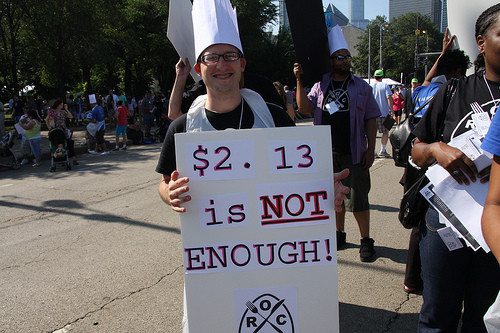

For Merleane S., a 19-year-old, single mom, her work shift on March 15 included taking and filling orders at a fast food restaurant in Palm Coast, Florida. She was earning the state’s minimum wage of $7.79 per hour. Similar to other U.S. workers, she was trying to make sure her family was secure.
That same day, in the nation’s capital, lawmakers in the U.S. House of Representatives unanimously voted against an amendment to H.R. 803, a job training bill. That amendment would have gradually increased the federal minimum wage from $7.25 an hour to $10.10 an hour by the end of 2015.
The amendment marked one of the most recent efforts regarding an issue that is gaining momentum nationally — an increased minimum wage. If the idea is approved, it would affect millions of workers across the income spectrum, including the middle class.
Merleane,
» Read more about: Not Only the Poor Benefit from Raised Minimum Wage »
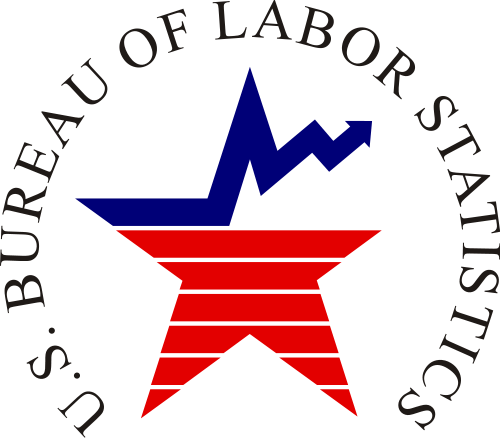

Bad news on the economy. It added only 88,000 jobs in March – the slowest pace of job growth in nine months.
While the jobless rate fell to 7.6 percent, much of the drop was due to the labor force shrinking by almost a half million people. If you’re not looking for work, you’re not counted as unemployed.
That means the percentage of working-age Americans either with a job or looking for one dropped to 63.3 percent — its lowest level since 1979.
The direction isn’t encouraging. The pace of job growth this year is slower than its pace last year.
What’s going on? The simple fact is companies won’t hire if consumers aren’t buying enough to justify the new hires. And consumers don’t have enough money, or credit, or confidence to buy enough.
It’s likely Americans are beginning to feel the pinches of January’s hike in the payroll tax combined with the government budget cuts known as the sequester.
» Read more about: April Is the Cruelest Month As the Economy Crawls Along »


The Asian Pacific American Labor Alliance (APALA), the Los Angeles Alliance for a New Economy (LAANE) and other community groups took legal action against the proposed Chinatown Walmart today by filing a lawsuit against the City of Los Angeles. The lawsuit challenges the process by which the building permits were issued.
The plaintiffs allege that the Department of Building and Safety violated city and state laws which require public approval of the permits by the Community Redevelopment Agency/LA board. Eighty Chinatown residents, Walmart workers and community activists rallied the same day to adopt principles for all development in Chinatown and demand that the community’s voice be heard.
The Asian Pacific American Labor Alliance, with the support of LAANE and Chinatown small businesses, filed multiple appeals against the permits when the store was first proposed in February 2012. The appeals asserted that the permits received inadequate review and were erroneously issued,
» Read more about: Community Groups Sue City Over Chinatown Walmart Permits »


How did the Los Angeles Metro recently leverage the purchase of 550 clean-fuel buses to create 200 U.S. manufacturing jobs?
What will it take to link the billions of federal dollars used for transportation investments to domestic job creation?
To begin addressing these questions, Living Cities invites you to join a webinar April 10 about the Transportation and American Jobs Project, a national effort to ensure that transportation investments using federal funds create quality jobs for American workers. Specifically, the webinar will provide an overview of the U.S. Employment Plan (USEP), a model transit procurement program which incentivizes investments in domestic manufacturing jobs. This innovative model has the potential to have significant economic impact in the rebuilding of the U.S. manufacturing sector. Speakers will include Professor Manuel Pastor, from the Program for Environmental & Regional Equity (PERE) at USC, and Madeline Janis,
» Read more about: Living Cities’ Invitation to a Job Creation Webinar »


The whining from some fast food chains that they won’t be able to afford paying for their employee’s health coverage under Obamacare has gotten a lot of press. But what is more troubling is the recent news that some big chains are concluding that the costs won’t be nearly as high as they had projected. The reason: their employees won’t be able to afford the health insurance and will instead pay a fine and remain uninsured. This fight is just the first battle in the coming war over Obamacare that will center on those who get left out. Big flaws in the bill will mean that many low-wage workers will be forced to choose between paying huge chunks of their income on premiums or on a penalty that leaves them with no coverage at all. Reformers should take note and get ready for the coming struggle.
Last week, the Wall Street Journal reported that Wendy’s lowered its estimate of the cost of Obamacare for each of its restaurants by 80 percent,
» Read more about: Obamacare: Not So Fast for Fast-Food Workers »
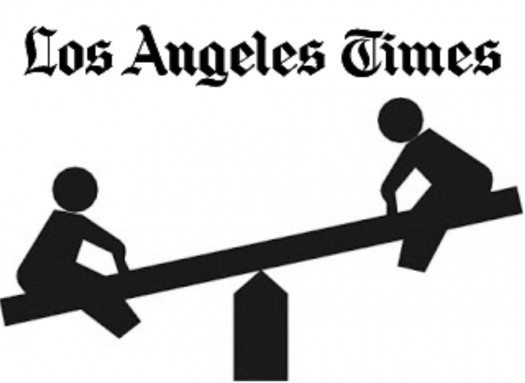
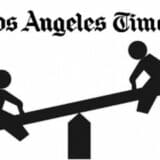
James Rainey’s L.A. Times story, “Garcetti, Greuel Step Gingerly Around City Labor Issues,” shows the problem with the press’ approach to writing so-called “balanced” stories.
Rainey’s story is generally a good one, filled with facts and figures. He’s even careful to use his data to set the record straight when it contradicts what one of his interviewees says. For example, after the County Federation of Labor’s Maria Elena Durazo says “that the average city worker receives $32,000 in retirement,” Rainey writes, “The website for the city’s civilian retirement system puts the average pension benefit for 12,000 current retirees about 40 percent higher than Durazo’s figure.”
Okay, so he checks Durazo’s stats and she appears to be mistaken.


Imagine a system that gives companies enormous tax breaks for firing workers – and then forces those jobless workers to pay for those tax breaks themselves.
It might sound outrageous, but in California, that’s the reality. Just ask Joan Beighley, who worked at VWR in Brisbane for 14 years before her job was eliminated when her employer decided to take advantage of the state’s wasteful “enterprise zone” (EZ) corporate tax giveaway program. Thanks to this flawed program, VWR is able to collect up to $37,000 for each worker the company fired and replaced when they shut down their Brisbane facility and relocated to Visalia – even though no new jobs were created, and the jobs in Visalia pay a fraction of what the Brisbane workers earned for the same work.
The VWR move cost the city of Brisbane more than $2 million a year, while the company took in a windfall $1.5 million,
» Read more about: Law Proposed to Stop Enterprise Zone Tax Giveaways »


Netflix’s new House of Cards series offers an inside look at Beltway power games and is far better than most of this genre—which is why its retrograde and even racist union-bashing is so unfortunate. For example, Episode Five sympathetically portrays politicians who lie to unions, and claims eliminating federal funding for school districts engaged in collective bargaining is necessary for education reform.
Teachers’ unions are shown as completely out of touch with members, and run not by their female and African-American elected political leadership but rather by white male political consultants. And in an episode that could have been produced by either Michelle Rhee or the National Right to Work Committee, House of Cards depicts elite interests as knowing better what workers want than their own unions. Beneath its plot turns and star power, the series — whose theme is “Bad,
» Read more about: “House of Cards” No Friend to the House of Labor »


“Independent Contractor represents that Independent Contractor is an independent contractor.”
I try to cultivate an appreciation for language, linguistic uses and linguistic misuses. I have an especial appreciation for legal writing, in all of its absurdity. I tend to become inured to the way that people – typically more powerful people – use language to obscure rather than to elucidate.
I also read a lot of legal documents, especially agreements between port trucking companies and individual drivers. These tend to be awful, one-sided, unconscionable documents. Port trucking companies employ drivers, and then write “CYA” documents to attempt to hide the fact that they are misclassifying their drivers. The owners create sham truck leases and force drivers to sign them. All par for the course in an industry as dysfunctional as port trucking.
But then I read a sentence like that one,
» Read more about: The Crooked Language Behind Job Misclassifications »


The minimum wage is back on the rise. Last month Sen. Tom Harkin and Rep. George Miller introduced the Fair Minimum Wage Act of 2013, which would raise the federal wage to $10.10. State legislatures aren’t waiting. The New York state assembly approved an increase to $9 plus indexing, the New Mexico state senate approved an increase to $8.50, and the Hawaii state senate and house each passed increases.
But that hasn’t stopped the doomsayers. The conservative Cato Institute called the minimum wage “zombie economics.” Paul Ryan said that “history is very clear” that it “costs jobs.” Marco Rubio said that “We have a lot of history to prove” that “raising the minimum wage does not grow the middle class.”
In fact, the historical record is quite clear. “Consider the Source: 100 years of Broken Record Opposition to the Minimum Wage,
» Read more about: What ‘Zombie Economics?’ The Minimum Wage & Its Critics »
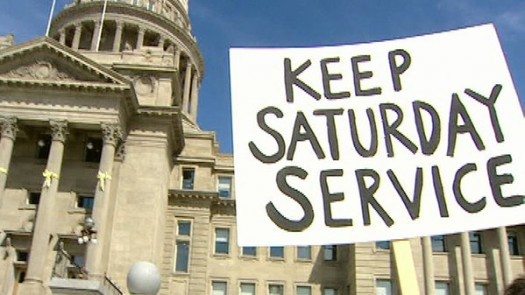

Over the past couple of months, lead stories on every media outlet across this nation have covered the “gloom and doom” angle of six-day postal delivery. But last Sunday, thousands of Letter Carriers, union members and allies came out to set the story straight on the real crisis that is facing the United States Postal Service.
In San Diego, Los Angeles, Fresno and San Francisco, rally participants let the communities they serve know that if the overzealous plan by Postmaster General Patrick Donahoe to eliminate Saturday mail delivery is allowed to happen, it would be one of the biggest mistakes our government would ever make.
Rally participants set the facts straight by letting everyone know that regardless of what he has been threatening to do, Postmaster Donahoe lacks the legal authority to implement this plan on his own. Decisions on delivery schedule are the purview of Congress, and every year for the past 30 years,
» Read more about: Postal Rallies: “Save Saturday Mail Delivery!” »


It’s time for California, long a leader in green energy investment, to take another big step forward on the environment and job creation.
When Californians passed Proposition 39 last year, they voted for more carbon reduction, school improvements and jobs – all through a five-year, $2.5 billion program using revenues from newly closed tax loopholes to pay for investments in energy efficiency and renewable energy. Now state policymakers are making critical decisions as they craft the guidelines for this massive new investment.
School facilities are the primary target of Proposition 39 retrofitting efforts. But if the measure is going to deliver on its promises of carbon reduction, healthier schools and neighborhoods, long-term career opportunities and a timely economic boost for communities that need it the most, the proposition needs to be implemented right.
I’ve been studying the green jobs sector since its early days, and my research and observations suggest some important recommendations.
» Read more about: Going Green and Growing Jobs, the Right Way »


If you’re like me, right now you may be scrambling to stock up on all of your Passover essentials. So what if I told you that you could get 12 boxes of matzah – more than enough to cover the eight days and nights of breadless revelry – for just over $40 bucks?
Ah, but there’s a catch: You’ll have to buy this miracle matzah pak at Walmart. Moral dilemma? You bet.
Last year we provided a short list of reasons you might want to think twice about a Walmart matzah binge. We wish we could report that Walmart had cleaned up its act since then, but alas, the world’s largest retailer has racked up a series of alleged corporate crimes and indiscretions that would make a pharaoh blush.
So before you succumb to those everyday low prices, here are five more reasons not to buy matzah at Walmart:
1) Hunger Strike: Remember those passages in the haggadah about the bread of affliction?
» Read more about: Five New Reasons Not to Buy Matzah at Walmart »
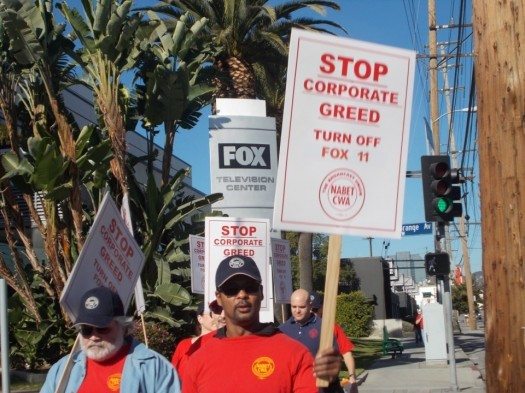
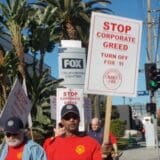
“What do ex-cons and trade unions in California have in common?” With those words, KTTV Fox 11 Vice-President and General Manager Kevin Hale begins his latest editorial criticizing California’s High Speed Rail Project, specifically a hiring policy that gives preferential treatment to disadvantaged workers.
“They are defining disadvantaged workers as former criminals and some union workers,” Hale says.
Mr. Hale is certainly entitled to his opinion about the bullet train, but when he starts lumping together criminals and union workers, I have to object.
His true anti-union colors are showing with that distortion of the facts.
Mr. Hale fails to mention in his editorial that the High Speed Rail Project also gives preferential treatment to several other groups, including veterans, single parents, former foster children, high school dropouts and the homeless.
But you’ll notice Mr. Hale doesn’t associate veterans, foster children or single parents with former criminals.


A new economy is coming. While Wall Street banks are on a trend of corporate mergers and acquisitions, Main Street businesses are generating community wealth while undergoing a transition of their own. Traditional companies are becoming worker cooperatives, both to sustain during tough economic times and because years of success have enabled these companies to reward their workers. State and local governments are beginning to get wise to this trend, too, adding legislative influence to an already vibrant movement.
Take the example of Zingerman’s Community of Businesses, an umbrella company that runs a fleet of food service outfits based in Ann Arbor, Michigan. Over the course of more than 30 years, Zingerman’s has become a statewide destination for food lovers, and their owners have become business community luminaries. Nearly 600 employees work in the eight distinct businesses that comprise the Zingerman’s Community, generating annual revenues of $46 million.


When voters approved Proposition 39 last November, they were voting for good clean-energy jobs, and energy efficiency projects in public schools and other public facilities that would save taxpayers money.
The proposition closed a corporate tax loophole and will provide up to $550 million annually in savings that, in the first four years, will go toward energy efficiency projects. An article that recently appeared in the industry press with the headline, “HVAC Contractor Ordered to Pay Nearly $1 Million for Violating Labor Law,” offers a cautionary tale for state lawmakers who are now considering how to spend those funds.
The article reports that California labor commissioner Julie Su ordered Ace Cooling & Heating Corporation, a contractor that installs heating and cooling systems for buildings, to pay nearly a million dollars in fines and wages to 10 employees for their work on a modernization project at El Camino Community College in Torrance.
» Read more about: Wage Theft Case Shows the Need for Workforce Standards »


Our Nation so richly endowed with natural resources and with a capable and industrious population should be able to devise ways and means of insuring to all our able-bodied working men and women a fair day’s pay for a fair day’s work. A self-supporting and self-respecting democracy can plead no justification for the existence of child labor, no economic reason for chiseling workers’ wages or stretching workers’ hours.
Enlightened business is learning that competition ought not to cause bad social consequences which inevitably react upon the profits of business itself. All but the hopelessly reactionary will agree that to conserve our primary resources of man power, government must have some control over maximum hours, minimum wages, the evil of child labor and the exploitation of unorganized labor. –FDR, May 1937
In his recent State of the Union address,
» Read more about: The Minimum Wage Offers the Working Poor Maximum Help »